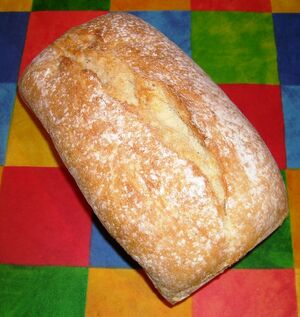Everyday white loaf (TM)
| Everyday white loaf (TM) | |
|---|---|
 |
| Servings: | 1 large loaf |
| Ready in: | 4 hours 10 minutes |
| Prep. time: | 3 hours 35 minutes |
| Cook time: | 35 minutes |
| Difficulty: | |
| Recipe author: | JuliaBalbilla |
| First published: | 20th September 2012 |
This recipe is based on one that I made at bread school day course at the Míele Experience Centre and has been adapted for making in a Thermomix. There is also a recipe for making this using the conventional method.
Ingredients
![]() Create a printable shopping list for this recipe's recipeIngredient
Create a printable shopping list for this recipe's recipeIngredient
- 15g fresh yeast
- 300g (approx) sparkling water, at room temperature (see Chef's notes below)
- 500g strong white bread flour
- ¾ teaspoon salt
- 15g olive oil
Method
- Add the yeast and water to the TM bowl.
- Mix for 2 minutes / Temp. 37° / Speed 1.
- Add the remaining ingredients in the order given above.
- 3 minutes / Knead
- Leave in the TM bowl until the dough has rested and is touching the lid.
- 12 seconds / Knead
- Tip the TM bowl upside down on a lightly floured surface .
- Loosen the blades by undoing the blade unit at the base. The weight of the blades will help the dough to drop out of the bowl onto the surface.
- Pull any remaining bits of dough off the blades and out of the bowl.
- Shape into a ball, place in an oiled bowl and cover with clingfilm.
- Leave until the dough has almost doubled in size (about an hour).
- Gently knock back, face downards into a rectangle, one side being the same length as the tin.
- Roll the dough towards you as tightly as you can.
- Flatten and stretch the ends and tuck them underneath so that they meet up in the middle.
- Place into a 900g / 2lb loaf tin, cover with clingfilm and prove until the dough reaches the top of the tin.
- Make some diagonal slashes across the top or one long one across the lenghth and bake at 220° C (425° F - gas 7), [fan oven 200° C & reduce cooking time by 10 mins per hour] for 30-35 minutes until golden.
- Cool completely on a wire rack.
Chef's notes
The amount of water you need can depend on the heat and humidity of your kitchen. It can also depend on the flour you are using. I used very strong Canadian bread flour, which like wholemeal, needs much more water than ordinary bread flour.
Discover Cookipedia's Culinary Creations on Pinterest
Explore the vibrant world of Cookipedia through our Pinterest page! We've curated a stunning collection of recipes that highlight the beauty of home-cooked dishes. It's the perfect way to visually navigate our extensive recipe library and get inspired by the flavors we’ve shared over the years. Dive in and discover your next favorite meal—one picture at a time!